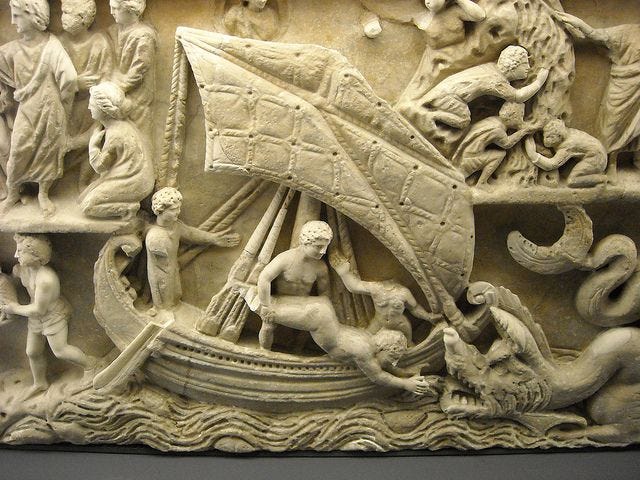Essential Skills for the Journey with Jesus
Reading the Bible Well (Pt. 5).
“For he himself is our peace, who has made the two groups one and has destroyed the barrier, the dividing wall of hostility…”
-Ephesians 2:14
Jonah is best known for the whale which plays a minor role in his story. In the modern mind, the idea of a man surviving for three days in the belly of a whale has become the key point. But the whale doesn’t show up until the story is well on its way and it isn’t a whale. It’s a fish. We need to apply our first skill of reading the Bible well if we are going to understand the book of Jonah.
Thankfully, this is fairly easy to do because Jonah immediately draws us into its story. “The word of the Lord came to Jonah son of Amittai.1” That is enough, by itself, to catch our attention. But if we have developed the second skill (the more we know the Bible the more we will understand it), it becomes even more interesting. The prophetic books of Jeremiah and Ezekiel use this phrase many times, beginning with their initial calling:
The word of the Lord came to him in the thirteenth year of the reign of Josiah son of Amon king of Judah… (Jeremiah 1:2)
…the word of the Lord came to Ezekiel the priest, the son of Buzi, by the River Kebar in the land of the Babylonians. (Ezekiel 1:3)
We are meant to read Jonah within the context of the other Biblical prophets. But as soon as we have made this connection the dissonance begins. Ezekiel follows the word of the Lord faithfully. Jeremiah perseveres even as he goes through much suffering. But Jonah’s reaction to the word of the Lord is completely unprecedented:
Jonah ran away from the Lord…and sailed for Tarshish to flee from the Lord.
Jonah has good reason to run away from Nineveh. Within the wider story of the Old Testament, the Jewish people struggle under foreign domination by the Assyrians, the Babylonians and the Greeks. Given that Nineveh was the capital of the Assyrian Empire, it was no wonder that Jonah headed in the opposite direction.
But things get even stranger as the story continues. Everything is upside down. A storm hits the ship. The sailors try to save the ship while Jonah sleeps through the chaos below deck. Jonah tells them to throw him into the sea because he caused the storm by running away from God. The sailors, who do not know Jonah’s God, hesitate because they do not what to offend his God. After trying other options they throw him in overboard and commit themselves to Jonah’s God. Jonah’s disobedience has turned the sailor’s hearts toward God.
This is when the fish makes its appearance. It isn’t until Jonah is in the belly of the fish that he finally prays. On the face of it, his prayer looks like a solid Psalm. But as we will see in the next chapter, it is a parody of sincerity. We have a hint of this in the way that Jonah gets from the fish back to land. Rather than carrying Jonah to the shore where the prophet can neatly hop onto the sand, the fish vomits him onto the beach.
After landing on the shore like. so much seaweed, Jonah brushes himself off and walks into Ninveveh like he was supposed to do in the first place. In the city we have another remarkable plot twist - the Ninevites not only respond to the message but go to the extreme calling on both animals and people to repent.
When Jonah’s warning reached the king of Nineveh, he rose from his throne, took off his royal robes, covered himself with sackcloth and sat down in the dust. This is the proclamation he issued in Nineveh:
‘By the decree of the king and his nobles:
Do not let people or animals, herds or flocks, taste anything; do not let them eat or drink. But let people and animals be covered with sackcloth. Let everyone call urgently on God. Let them give up their evil ways and their violence. Who knows? God may yet relent and with compassion turn from his fierce anger so that we will not perish.’2
These extremes finally draw out the main point of the book in Jonah’s prayer:
He prayed to the Lord, ‘Isn’t this what I said, Lord, when I was still at home? That is what I tried to forestall by fleeing to Tarshish. I knew that you are a gracious and compassionate God, slow to anger and abounding in love, a God who relents from sending calamity.3
Jonah learned this proclamation from the Pentateuch:
And he passed in front of Moses, proclaiming, ‘The Lord, the Lord, the compassionate and gracious God, slow to anger, abounding in love and faithfulness…4
This was good news in the book of Exodus. But for Jonah, this quality of God has become a problem. The rest of the book is about God trying to change Jonah’s hardened heart. The story ends without letting us know if Jonah learned the lesson. The question for us, as the readers, is not has Jonah learned this lesson but have we?
Our sense of right and wrong can set us against the kindness of God. Jewish people in those days could ask why Ruth, a non-Jew, should become an integral part of the family tree of the Jewish Messiah. They could ask why the Ninevites should receive mercy from God. It doesn’t seem right. And we, like them, have our own sense of justice that can be threatened by God’s compassion.
The book of Jonah is not about biology, history, or faith. It questions our willingness to participate in God’s compassion. If asked, are we prepared to cross the lines we have drawn between friends and enemies for our protection?



